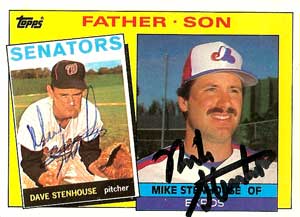Mike Stenhouse: How MLB has dissed retirees like my Dad!
With the Major League Baseball All-Star Game coming up next week, I am reminded of my dad’s ignominious plight.
Most baseball fans do not realize that there are 504 former players, including my dad, Cranston, Rhode Island’s Dave Stenhouse, who are being jipped out of well-deserved pensions by the league (MLB) and the players’ association (MLBPA).
When the new collective bargaining agreement (CBA) was recently ratified earlier this year, it stipulated that, for every 43 days a man accrued on an active roster, he’d get $718.75, up to the maximum, $11,500. Previously, the retiree received $625 for every 43 games on a roster, up to $10,000 each year. A 15% raise for those on the lowest income rung in the MLB family.
Meanwhile, the maximum allowable pension a vested ballplayer can receive is $245,000, according to the IRS. Of course, the union took care of themselves first and foremost. The rank and file received a 23.8 % raise in the minimum salary, from $565,500 to $700,000.
As most of you know, I am the Executive Director of the Rhode Island Center of Freedom and Prosperity and a Harvard graduate with a degree in economics. I played in the major leagues with the Boston Red Sox, Minnesota Twins, and Montreal Expos. I penned a heartfelt June 2018 Op-Ed in the Wall Street Journal protesting the way Dad and the other men have been treated by the sport.
As a rookie for the Washington Senators, my dad was the American League’s starting pitcher in the 1962 All-Star Game. After starting the season 6-3, he finished 11-12 with a 3.65 Earned Run Average in 34 games. Even though I played fewer years than my dad, I get an MLB pension. My brother, Dave Stenhouse, Jr., never got called up to The Show and only made it as far as the team’s Triple A- affiliate, the Syracuse Skychiefs. Of course, their is also no retirement system for great minor league players like my brother who never acquired the requisite time in “the show”.
Neither the league nor the union want to retroactively restore these men into pension coverage; instead, taxes are taken out of the nonqualified annuity payment, which cannot be passed on to a surviving spouse or designated beneficiary. So when my dad passes on, the payment he is currently receiving won’t go to my mom. They are also not eligible to be covered under the league’s umbrella health insurance plan.
A native of Westerly Rhode Island and a proud graduate of the University of Rhode Island, my dad turns 89 this September. Friends like Doug Gladstone, who wrote a book about this issue, “A Bitter Cup of Coffee”, has been doing all he can to try to raise awareness among the MLB elite.
But the mainstream media refuses to touch this compelling story and current players seem oblivious to the plight of their struggling predecessors.



